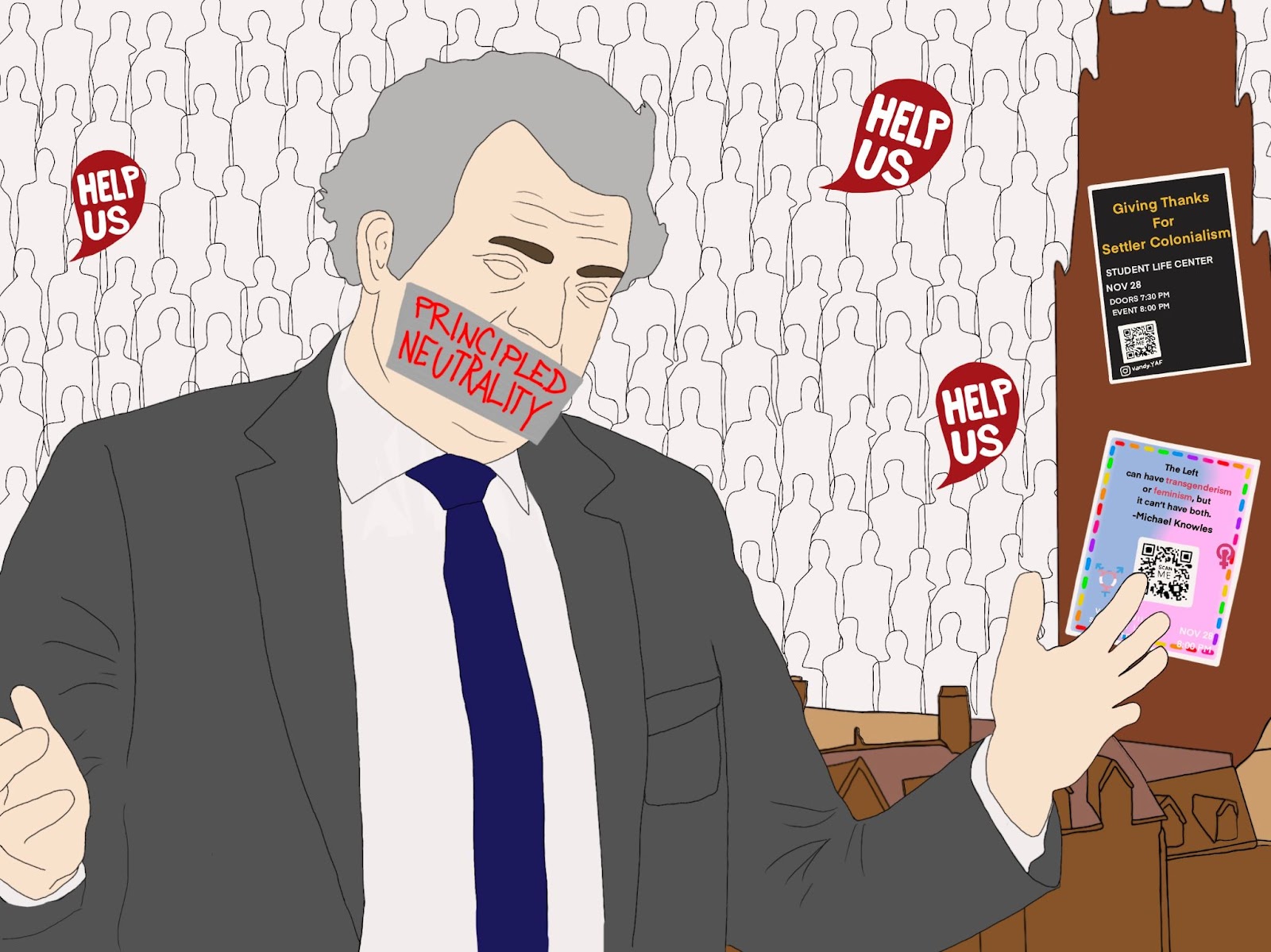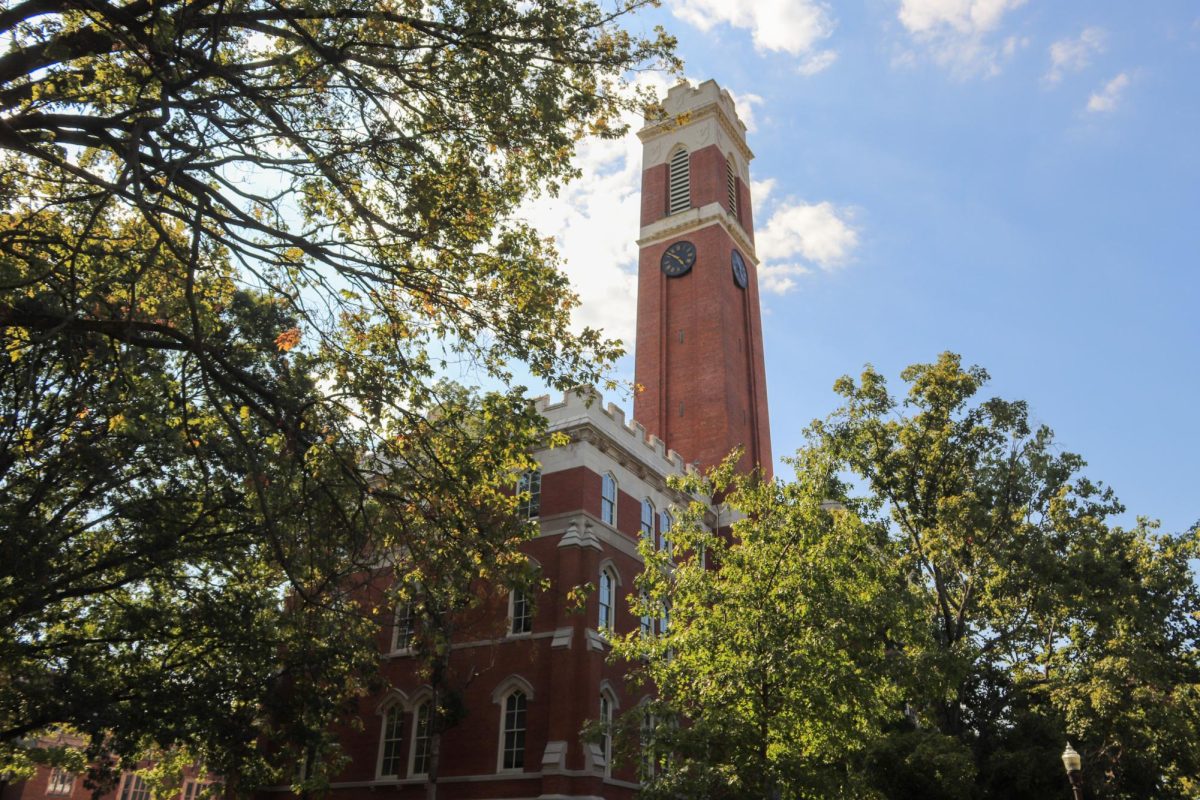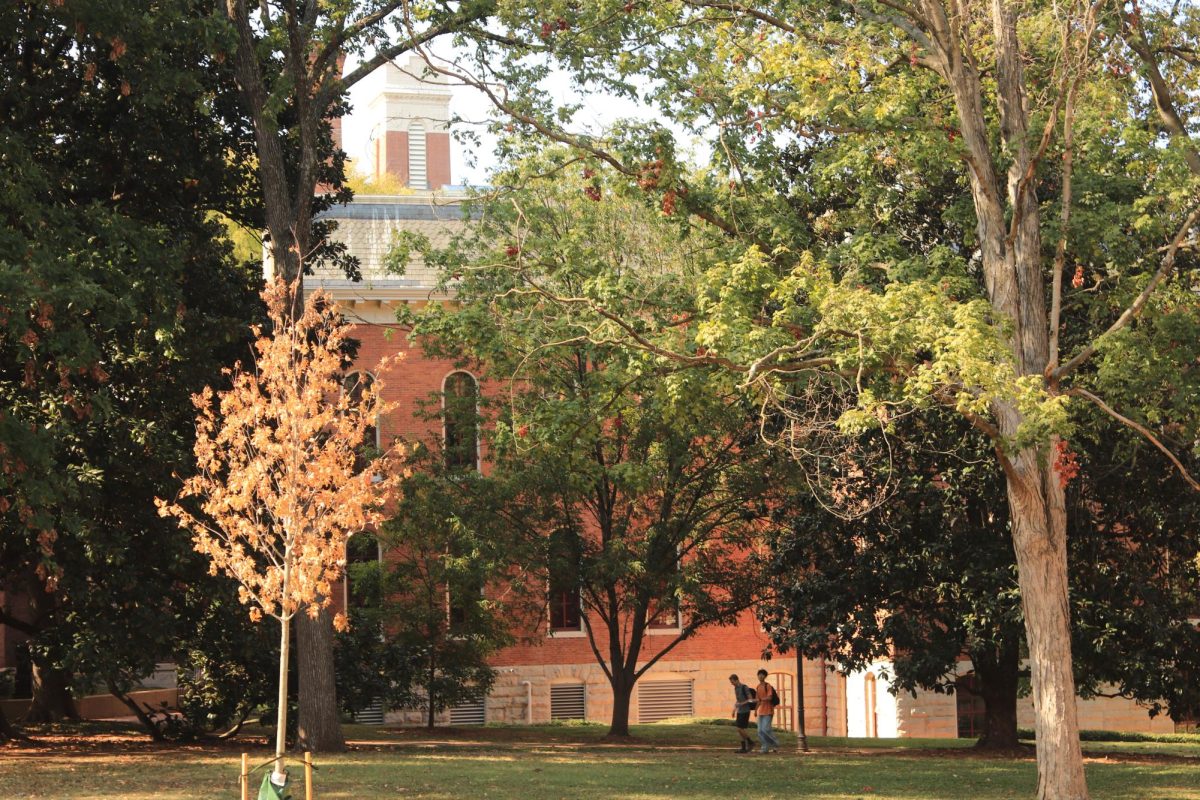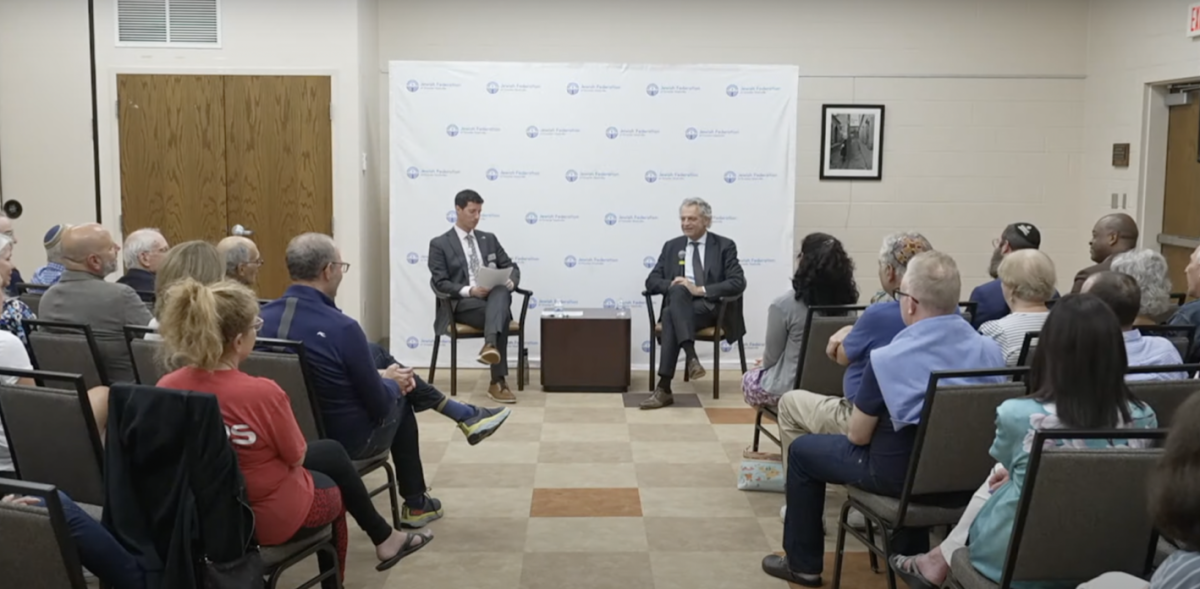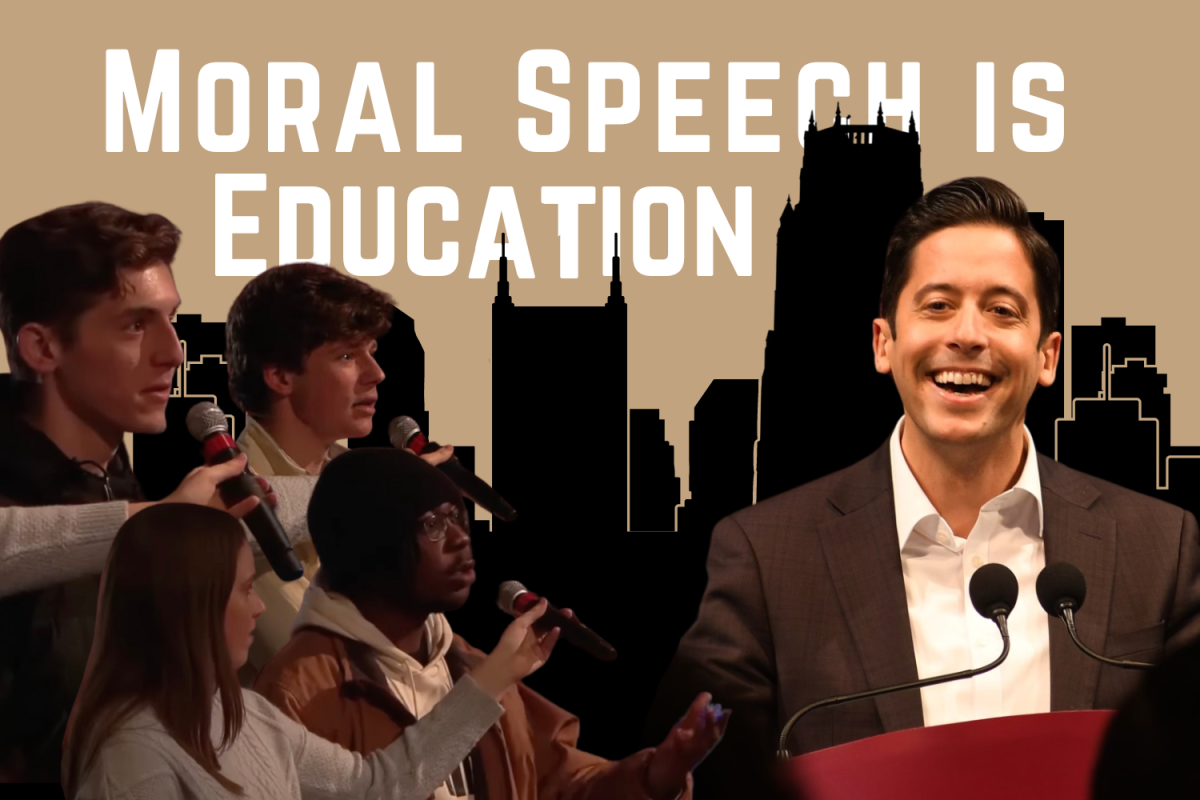Freedom of speech and open dialogue are indisputably the fundamental pillars of academia that should be upheld by every academic institution. However, concerns arise when differentiating free speech from hate speech — where do we draw the line between exposing students to different opinions and exposing them to possible psychological and physical harm?
Michael Knowles event
In efforts to promote its speaker event with Michael Knowles on Nov. 28, 2023, Vanderbilt’s Young Americans for Freedom plastered flyers stating “Giving Thanks For Settler Colonialism” and “The Left can have transgenderism or feminism, but it can’t have both” around campus. Knowles is a conservative political commentator known for his radically transphobic, misogynistic and racist remarks, which he attaches to religious beliefs.
These flyers were a scary sight for many, especially on a campus that preaches diversity, inclusion and the prioritization of student, faculty and staff well-being. Although a student organization posted these flyers and held this event, any flier, event or organization that is not approved by the university is subject to removal. Considering that the flyers and event were not prohibited or taken down, I see it as at least a permission — and at most an implicit endorsement — of Knowles’s hate speech by the Vanderbilt administration. Further, the fact that students must ostensibly get university approval for posting signs — a basic form of expression — is troubling. Proponents of principled neutrality might argue that the university’s laissez-faire attitude creates a freer environment for student expression. However, since student speech must always be filtered through administrative channels, principled neutrality and Vanderbilt’s associated free speech policies actually undercut student expression.
At the speaker event, Knowles made violent and disturbing assertions; he began by justifying his call for the “eradication of transgenderism from public life entirely.” This statement was quickly followed by supporters in the crowd chanting “U-S-A.” Protesters interrupted his speech in support of transgender individuals, and Knowles argued with one in the crowd, saying “There is no such thing as a trans person. It’s not real, it’s not a real category of being because a man can’t be a woman and a woman can’t be a man. So, we need to support the good of all people, especially these very confused people.” While supporters clapped — interrupting his words — after every vile proclamation he spewed, protestors were escorted from the event. Knowles laughed, asking the crowd, “Do we have any other lunatics in the room who want to shout anything? Anybody? No, okay, just normal people.” Vanderbilt’s administration failed to anticipate the devastating and dangerous impact of the Knowles event on the community. Despite claims that the university does not condone harmful rhetoric or discrimination, approving YAF’s event and providing a platform for transphobia feels like setting a precedent for the allowance of hate speech.
In response to the unacceptably harmful flyers put up by YAF, I filed a report to the Equal Opportunity and Access Office on Nov. 28, 2023. Three months later — on Feb. 27, 2024 — I finally received a response stating:
“EOA understands the messaging content on the flyers was hurtful and upsetting to many, and advanced viewpoints for which many would disagree. With that being said, based on our review, the situation was managed in accordance with the university’s policies, and there will be no further investigation into this claim.”
The EOA’s acknowledgement of the harmful messaging feels empty and performative given its subsequent refusal to take further action to reconcile the damage done. Given the university’s firm stance that hate speech and discrimination have no place here, this lackluster dismissal of my report leaves me wondering why the harmful nature of these flyers was not taken more seriously. The Vanderbilt mission statement on institutional neutrality declares that “institutional neutrality is the commitment our university leaders make to refrain from taking public positions on controversial issues unless the issue is materially related to the core mission and functioning of the university.” However, in no context should blatant acts of transphobia be “controversial issues” subject to debate and discourse. If anything, these acts are directly “related to the core mission and functioning of the university,” considering that there are Vanderbilt students who identify as transgender.
Tennessee has a long history of anti-transgender and anti-LGBTQ+ legislation. VUMC itself was thrown into this discourse after it was sued for providing medical records of non-anonymized transgender patients to the Tennessee attorney general upon request. Against this political backdrop, Vanderbilt purports to be a safe place for LGBTQ+ students. Through the university’s recently developed LGBTQI+ Task Force and the nine institutional LGBTQ+ programs already available to the Vanderbilt community, the university promotes itself as strongly committed to protecting and supporting LGBTQ+ students. However, YAF and the Knowles speaker event forced the Vanderbilt community to question the university’s values; does the university really care about the safety and well-being of our community, and is our institution really as neutral as it claims to be? Especially in the political climate of Tennessee, allowing YAF to invite a speaker with such violently transphobic views on Vanderbilt’s campus was a dangerously neglectful move by our administrators. By permitting firebrands like Knowles to speak on campus, Vanderbilt risks alienating and harming important community members while allowing Knowles to profit from outlets that help boost his brand image and recognition. More outrageously, administrators have so far neglected to do the minimum of sending out a campus-wide email condemning these acts of hate and providing support.
A continuous pattern
YAF’s Knowles event was not the first instance of Vanderbilt administrators’ inability to critically and compassionately assess sensitive situations and condemn all forms of hate. On Oct. 28, 2023, Vanderbilt’s Muslim Students Association posted a statement to its Instagram account, stating that members of the organization were “being physically intimidated, being called ‘terrorists,’ and being harassed while collecting donations for charity.” It described how these students felt unsupported and ignored by the university despite several meetings with administrators and asking them to “directly address these concerns.” Similarly, Jewish students on campus have expressed facing antisemitism on campus and feeling unsupported by the administration.
A couple of weeks later in mid-November, Vanderbilt’s chapter of Students for Justice in Palestine hosted a demonstration in response to what I am certain is a genocide occurring in Gaza. The university-approved memorial exhibit displayed white bags splattered with red paint and signage on campus near Rand Hall, quantifying the immense destruction of Palestinian life taking place in Gaza. Although this exhibit was intended to be an informative, peaceful and non-discriminatory protest, several students took to social media to condemn Vanderbilt’s approval of it as an “enforcement of antisemitism within this campus.” Another student posted that, by approving the exhibit, Vanderbilt proved that it “does not protect its Jewish students” as they “no longer [felt] safe on [Vanderbilt’s] campus.”
Several days later, Vanderbilt’s Vice Provost for Student Affairs and Dean of Students G.L. Black sent a campus-wide email about the recent student activity on campus. Although Black’s email stated that discrimination and harassment of all kinds have no place at Vanderbilt, the email simultaneously included implicitly biased language differentiating between “Palestinian casualties” and “victims of the Oct. 7 Hamas attacks.” The term “casualties” connotes that the mass killing of Palestinians is an “accident” or a mere by-product of war. Alternatively, the term “victims” carries more emotional weight, suggesting that one was explicitly targeted by a crime. Regardless of the intentions behind these word choices, if Vanderbilt was truly “neutral,” communications from its leaders would use identical phrasing when describing Israeli and Palestinian deaths. However, this Freudian slip shows the administration’s inability to follow its own standards of neutrality.
Additionally, the administration’s rather quick response to complaints about the exhibit — being sent just five days after it occurred — contrasted with its lackluster and delayed response to the reports of Muslim students revealed a concerning disparity in its urgency and willingness to address different issues. This same degree of promptness was not extended to MSA when organization leaders raised multiple concerns regarding Islamophobia on campus. While describing the details of specific harassment incidents may not be appropriate in an email to the wider community, promptly expressing awareness and concern about an increase in such incidents is certainly well within the school’s capabilities. Through these actions and inactions, the university is biased in its response by addressing concerns of antisemitism on campus more adequately than concerns of Islamophobia. It is imperative that the administration takes the concerns raised by Jewish students about antisemitism seriously. In the same vein, it is equally imperative that the reports of Islamophobia and anti-Muslim discrimination made by Muslim and Arab students are taken seriously.
Similarly, LGBTQ+ students and allies continue to look to Vanderbilt for support in the wake of Knowles’s discriminatory statements on campus. While Black’s email mentioned Islamophobia, antisemitism and xenophobia, there have been no statements made after the Knowles event that pertain directly to discrimination faced by transgender and LGBTQ+ students. As a student, I see extending support and reassurance to the Vanderbilt community as below the bare minimum of what administrators should be doing. Based on the deafening silence regarding the indisputably unacceptable public displays of transphobia during the Knowles event, two things were made painfully clear to me: our administrators are unable and unwilling to advocate for their students.
The larger problem with principled neutrality beyond Israel-Palestine and Knowles
Vanderbilt celebrates diversity on the covers of brochures and in admissions statistics but fails time and time again to protect its students from hate speech and discrimination. Given that so many colleges now function as businesses, Vanderbilt’s refusal to combat transphobia and Islamophobia on campus in a meaningful manner appears to me as a case of this institution valuing its relationship with wealthy alumni and donors over its commitment to its core values and protecting its students.
Expanding beyond just issues of transphobia and Islamophobia, ignoring and normalizing minority discomfort and exposing marginalized groups to unnecessary harm is apparently a more digestible consequence for the Vanderbilt administration than receiving conservative pushback or pulled endowments. The university’s abuse of silence and ignorance in the name of “principled neutrality” and its permission of harmful rhetoric in the name of “free speech and open dialogue” is disgusting. An overwhelming sense of shame consumes me when I walk around a campus covered in flyers glorifying settler colonialism and transphobia. Worst of all, I am ashamed to attend a university with administrators who care more about appearing “neutral” than the collective security and trust of those who make the Vanderbilt community a leading global institution. Vanderbilt’s administration is incapable of upholding its core values of diversity, inclusion and creating a compassionate and welcoming environment for all. Instead, Vanderbilt has silenced minority voices, promoting hateful speech and ignoring the cries of the people who make up Vanderbilt. By saying nothing, Vanderbilt administrators are saying everything — they do not actually care about protecting the well-being of their students, faculty and staff. Students cannot help but feel that the university only cares about protecting its image.
When Vanderbilt’s administrators use “principled neutrality” as a shield for maintaining endowments and a clean reputation, that’s not neutrality — it’s cowardice. I implore the university to embody the equity its leaders tirelessly speak of. This piece is a request to stop putting “neutrality” and “free speech” above the safety and security of the students, faculty and staff. It is a last-ditch attempt to request some glimpse of humanity in a wasteland of moral apathy. To cherry-pick who deserves consolation and who does not, who is a “victim” and who is a “casualty,” is utterly despicable.
Transgender students, faculty and staff do not feel safe on campus when the university allows groups like YAF to invite known transphobes like Knowles to tell the community to “eradicate transgenderism.” Muslim, Islamic and Arab students, faculty and staff do not feel safe on campus when they are facing unaddressed harassment, berating and ostracization from other Vanderbilt community members. Marginalized students of all backgrounds do not feel safe on a campus where they know they can and probably will be the next target of permissible hate speech.
To the Vanderbilt administration, shame on you. The greatest abuse of power occurs when those in charge do not use it at all. As administrators, your highest priority should be to protect your students and create a sincerely safe and welcoming space for all — not just for some. Administrators must make their support for all marginalized students resolutely known. If a student reports having been negatively affected by discrimination or attacks on their identity, administrators have the duty of addressing the issue with compassion and genuine effort instead of weighing the risks and benefits of supporting students as if it were a business deal.
There must be more proactive administrative assistance for all identity and advocacy organizations on campus instead of forcing these already-neglected groups to fight for their needs alone. Although Vanderbilt houses identity centers for various religious, gender, sexual and racial identities, these students must continue to jump through hoops in search of assistance from faculty advisors and approval from administrators when looking to engage in student advocacy.
To “dare to grow,” the university must first dare to care. Dare to advocate for and protect the students, faculty and staff who make up this institution. Dare to unequivocally and sincerely condemn all forms of hatred and discrimination. Dare to make Vanderbilt the diverse and inclusive university it claims to be. Dare to listen, dare to meet your own expectations and, most importantly, dare to speak up.



